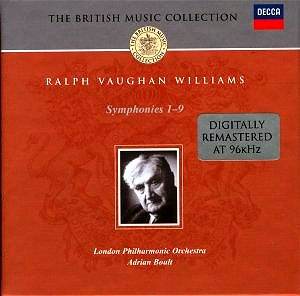Yes, that's right! The complete RVW symphonies
on Decca from Boult and the LPO. These are with one crucial exception
the same recordings that emerged in the sixties on Ace of Clubs LPs
then on Eclipse budget vinyls. The CD era saw these mono recordings
emerge on Belart and then on the Australian Eloquence series. All previous
entities have had to make do with the first eight symphonies as Boult
did not record the Ninth with Decca. Instead the Ninth appeared, also
in mono, on Everest, since subsumed into Omega. It is now thanks to
both the late lamented Omega and Decca that at last this pioneering
mono version of the cycle can be presented complete. It must have been
a close squeak though as Omega ceased operating as recently as couple
of months ago.
The cycle is well known and Bill Hedley wrote
about it not so very long ago so only a few observations as we go
along. A Sea Symphony catches Boult in golden form and his soloists
have never sounded better. If Boult's EMI Classics stereo cycle
is resplendently recorded by Messrs Bishop and Parker it is this mono
traversal that finds everyone in blazing form. Boult's furious petulance
matched by the LPO can be heard in the rage and rip of the scherzo.
Boult was always good at the metaphysical and visionary side and the
surge and undertow of the Whitman's waters. But his hell-for-leather
tendencies (also on the two Boult/LPO Sibelius tone poem anthologies
on Omega) are not always best appreciated. A London Symphony is
all quicksilver and mystery and while it sounds very well (try the scherzo)
I do miss the extra atmosphere and airiness that comes with the EMI
version. The Third and the Fifth share a CD and they segue neatly with
the last movement of the Third which opens with a typically late Sibelian
gesture (just before Margaret Ritchie's soft vocalisation) preceding
the Nordic horn motif that launches the mystical and prayerful Fifth
in which Boult conjures the forward force of progress more effectively
than in the 1960s version. The Sixth and Fourth share the smoke and
cordite of the same furies and each flares and flames. Try the rising
eldritch violins at 1.39 in first movement of the Sixth. The Seventh
is successfully put across. It sounds very good. The Eighth is in stereo
but is prone to some distortion currently beyond digital restoration.
The Ninth has the least hiss and was recorded within
months of the work's premiere under Sargent. It is also in stereo. The
Ninth was made more than six years after the first sessions for this
cycle … and it shows. Everest's recording is closer, gripping, faithful
and unflinching in putting across the Hardy-inspired cold majesty of
the piece.
The cycle is presented digitally remastered at 96 KHz.
It sounds better than ever but no matter how much renovation work we
are still dealing with mono originals from the 1950s. Hiss is present
though not a distracting issue. There is a roughened texture to the
sound of London Philharmonic Choir but the voices of Cameron and Baillie
register with a luxurious security never before achieved from these
masters.
The recordings were made in the Kingsway Hall and the
producer/engineer team was John Culshaw and Kenneth Wilkinson. The composer
attended all the sessions except those for the Ninth Symphony. He died
some seven hours before the start of those Everest sessions.
The notes are by Michael Kennedy so we know we are
in trustworthy hands.
The texts of A Sea Symphony and the superscriptions
to Antartica are all there in the booklet.
These are classic historic recordings. For RVW enthusiasts
they represent a classic page in the history of these symphonies. At
one stage they were the only ‘page’.
Rob Barnett


![]() London Philharmonic Orchestra/Adrian Boult
London Philharmonic Orchestra/Adrian Boult ![]() DECCA - THE BRITISH MUSIC COLLECTION
473 241-2 [5CDs: 67.46+79.30+72.17+74.21+73.22]
DECCA - THE BRITISH MUSIC COLLECTION
473 241-2 [5CDs: 67.46+79.30+72.17+74.21+73.22]